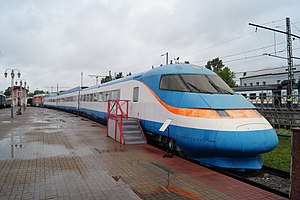Sokol (Сокол, Russian for "falcon") was a planned high-speed train in Russia.[1] It was to be a successor of the ER200 for use on the Moscow–St. Petersburg mainline, and was designed to operate at a cruising speed of 250 km/h. A prototype was built in 2000 and tested by Russian High Speed Railway Shareholding Co.[2]
| ES250 (Falcon) | |
|---|---|
 | |
| Manufacturer | RAO VSM |
| Formation | 6 cars |
| Capacity | 350 |
| Operators | Russian Railways |
| Lines served | Moscow - St Petersburg |
| Specifications | |
| Car length | 26 m (85 ft 3+5⁄8 in) |
| Width | 3.12 m (10 ft 2+7⁄8 in) |
| Maximum speed | 250 km/h (155 mph) |
| Weight | 356 t (350 long tons; 392 short tons) |
| Power supply | (?) |
| Electric system(s) | 3 kV DC 25 kV 50 Hz AC (dual voltage units) Overhead catenary |
| Current collector(s) | Pantograph |
| Track gauge | 1,520 mm (4 ft 11+27⁄32 in) Russian gauge |
The Sokol project was cancelled in 2002.[3] Instead of a Sokol-based design, high speed trainsets (named Sapsan) based on the Siemens Velaro were procured from Siemens in Germany.[4] The Sapsan trains have been operating on the Moscow–St. Petersburg line since December 2009.
References
edit- ^ The all-Russian high-speed train - World Report from International Railway Journal, August 2001, via www.findarticles.com
- ^ "Sokol can't fly yet". Railway Gazette International. 1 October 2001. Archived from the original on 16 June 2011.
- ^ Андрей Гурьев (2009), Андрей Гурьев И какие же русские не любили быстрой езды? История обреченного проекта (PDF) (in Russian), p. 352,
2002, март — прекращение со стороны МПС по инициативе министра Г.М. Фадеева финансирования проекта «Сокол»
- ^ Murray Hughes (1 June 2005). "Broad gauge ICE3 in sight". Railway Gazette International. Archived from the original on 9 August 2011.
External links
edit- High Speed Trains - Sokol Archived 2009-05-01 at the Wayback Machine 4rail.net